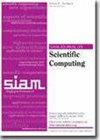基于共识的罕见事件估计
IF 2.6
2区 数学
Q1 MATHEMATICS, APPLIED
引用次数: 0
摘要
SIAM 科学计算期刊》,第 46 卷第 3 期,第 A1487-A1513 页,2024 年 6 月。 摘要本文介绍了一种基于自适应重要性采样的罕见事件估计新算法。我们考虑了最优重要性采样密度的平滑版本,该密度由相互作用的粒子集合近似得到。粒子动态受 McKean-Vlasov 随机微分方程控制,该方程在[Carrillo 等人,Stud. Appl. Math.,148 (2022),第 1069-1140 页]中引入并分析了贝叶斯逆问题背景下产生的基于共识的采样和后验分布优化。我们为算法的内部参数开发了自动更新功能。这包括指数欧拉法的新型时间步长控制器,它将粒子动力学离散化。所有参数更新的行为都取决于用户指定的易于解释的精度标准。我们在数值实验中表明,我们的方法与用于罕见事件估计的最先进的自适应重要度采样算法(即用于罕见事件估计的序列重要度采样方法和集合卡尔曼滤波器)相比具有竞争力。计算结果的可重复性。本文被授予 "SIAM 可重复性徽章":代码和数据可用",以表彰作者遵循了 SISC 和科学计算界重视的可重现性原则。读者可以通过 https://github.com/AlthausKonstantin/rareeventestimation/tree/master/docs/figures_paper 和补充材料(rareeventestimation-0.3.0.zip [9.66MB])中的代码和数据重现本文的结果。本文章由计算机程序翻译,如有差异,请以英文原文为准。
Consensus-Based Rare Event Estimation
SIAM Journal on Scientific Computing, Volume 46, Issue 3, Page A1487-A1513, June 2024.
Abstract. In this paper, we introduce a new algorithm for rare event estimation based on adaptive importance sampling. We consider a smoothed version of the optimal importance sampling density, which is approximated by an ensemble of interacting particles. The particle dynamics is governed by a McKean–Vlasov stochastic differential equation, which was introduced and analyzed in [Carrillo et al., Stud. Appl. Math., 148 (2022), pp. 1069–1140] for consensus-based sampling and optimization of posterior distributions arising in the context of Bayesian inverse problems. We develop automatic updates for the internal parameters of our algorithm. This includes a novel time step size controller for the exponential Euler method, which discretizes the particle dynamics. The behavior of all parameter updates depends on easy to interpret accuracy criteria specified by the user. We show in numerical experiments that our method is competitive to state-of-the-art adaptive importance sampling algorithms for rare event estimation, namely a sequential importance sampling method and the ensemble Kalman filter for rare event estimation. Reproducibility of computational results. This paper has been awarded the “SIAM Reproducibility Badge: Code and data available” as a recognition that the authors have followed reproducibility principles valued by SISC and the scientific computing community. Code and data that allow readers to reproduce the results in this paper are available at https://github.com/AlthausKonstantin/rareeventestimation/tree/master/docs/figures_paper and in the supplementary materials (rareeventestimation-0.3.0.zip [9.66MB]).
Abstract. In this paper, we introduce a new algorithm for rare event estimation based on adaptive importance sampling. We consider a smoothed version of the optimal importance sampling density, which is approximated by an ensemble of interacting particles. The particle dynamics is governed by a McKean–Vlasov stochastic differential equation, which was introduced and analyzed in [Carrillo et al., Stud. Appl. Math., 148 (2022), pp. 1069–1140] for consensus-based sampling and optimization of posterior distributions arising in the context of Bayesian inverse problems. We develop automatic updates for the internal parameters of our algorithm. This includes a novel time step size controller for the exponential Euler method, which discretizes the particle dynamics. The behavior of all parameter updates depends on easy to interpret accuracy criteria specified by the user. We show in numerical experiments that our method is competitive to state-of-the-art adaptive importance sampling algorithms for rare event estimation, namely a sequential importance sampling method and the ensemble Kalman filter for rare event estimation. Reproducibility of computational results. This paper has been awarded the “SIAM Reproducibility Badge: Code and data available” as a recognition that the authors have followed reproducibility principles valued by SISC and the scientific computing community. Code and data that allow readers to reproduce the results in this paper are available at https://github.com/AlthausKonstantin/rareeventestimation/tree/master/docs/figures_paper and in the supplementary materials (rareeventestimation-0.3.0.zip [9.66MB]).
求助全文
通过发布文献求助,成功后即可免费获取论文全文。
去求助
来源期刊
CiteScore
5.50
自引率
3.20%
发文量
209
审稿时长
1 months
期刊介绍:
The purpose of SIAM Journal on Scientific Computing (SISC) is to advance computational methods for solving scientific and engineering problems.
SISC papers are classified into three categories:
1. Methods and Algorithms for Scientific Computing: Papers in this category may include theoretical analysis, provided that the relevance to applications in science and engineering is demonstrated. They should contain meaningful computational results and theoretical results or strong heuristics supporting the performance of new algorithms.
2. Computational Methods in Science and Engineering: Papers in this section will typically describe novel methodologies for solving a specific problem in computational science or engineering. They should contain enough information about the application to orient other computational scientists but should omit details of interest mainly to the applications specialist.
3. Software and High-Performance Computing: Papers in this category should concern the novel design and development of computational methods and high-quality software, parallel algorithms, high-performance computing issues, new architectures, data analysis, or visualization. The primary focus should be on computational methods that have potentially large impact for an important class of scientific or engineering problems.

 求助内容:
求助内容: 应助结果提醒方式:
应助结果提醒方式:


